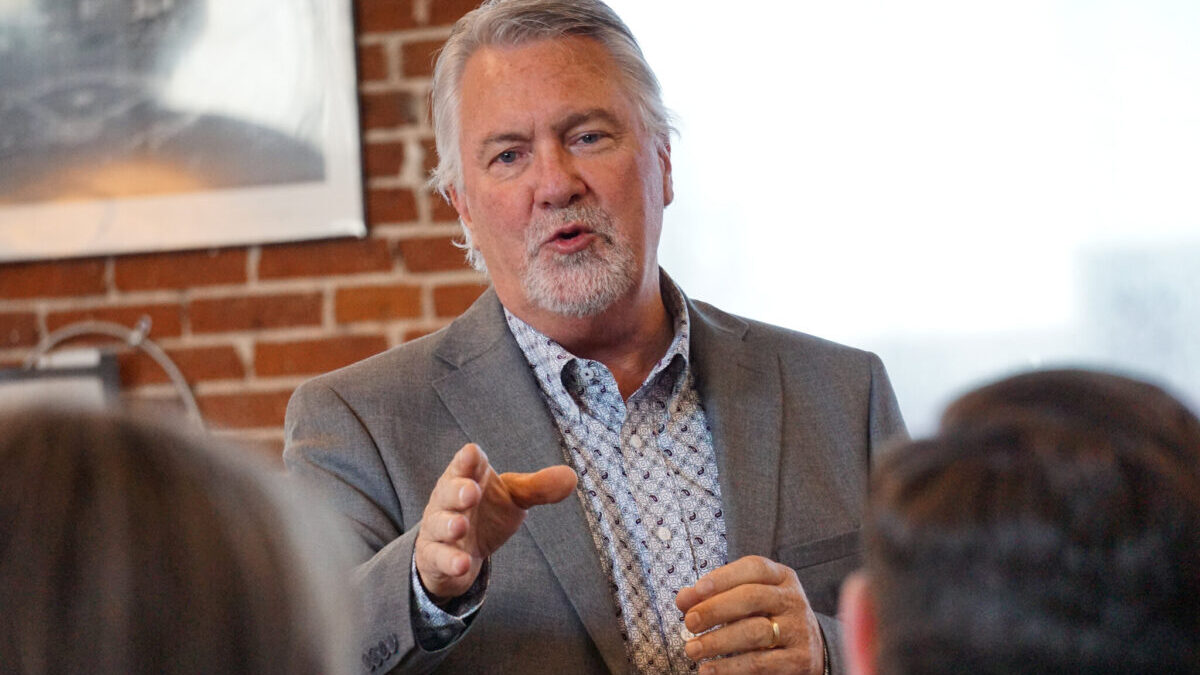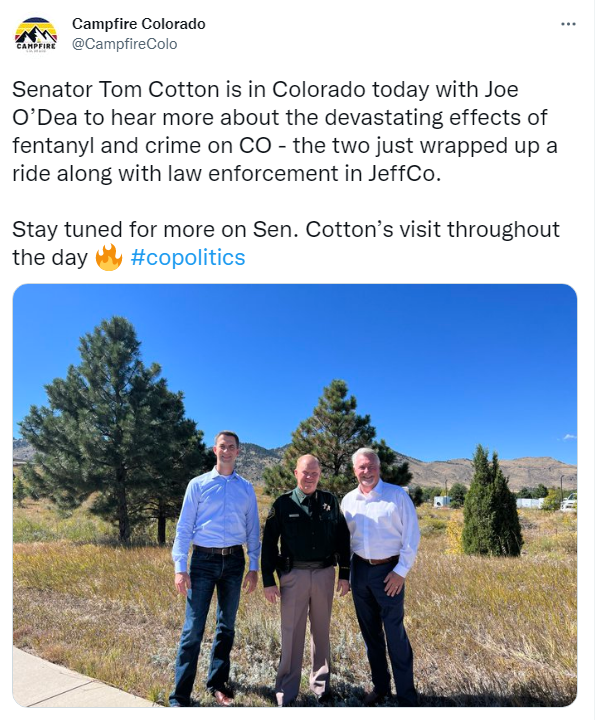DENVER — Conservatives have a lot to be skeptical about when it comes to Colorado Republican Senate nominee Joe O’Dea.
A first-time candidate with no record to run on beyond 30 years in the construction industry, O’Dea is a pro-abortion Republican chasing a blue seat in the upper chamber with the full support of party leadership.
Profiled in The Economist as “an alternative to Trumpism,” O’Dea is a supporter of abortion up to five months of pregnancy, backs granting citizenship to millions of illegal immigrants, and just last week repeated Democrats’ lies that President Donald Trump waited “three and a half hours to say ‘enough’s enough'” as rioters stormed the Capitol on Jan. 6, 2021. (It was actually 25 minutes).
In July, GOP Senate Minority Leader Mitch McConnell blessed O’Dea as “the perfect candidate” in a year that McConnell, the top elected Republican in the country, has been complaining about “candidate quality.”
And despite many reasons to be skeptical of O’Dea, even Sen. Tom Cotton, R-Ark., who is among the most reliably conservative lawmakers on Capitol Hill, with a 96 percent rating from Heritage Action for America, was in Colorado on Monday to make the case for O’Dea.
“I know that [O’Dea] will not vote for Joe Biden 98 percent of the time, which is what Michael Bennet will do,” Cotton told The Federalist on the sidelines of an event with about two dozen supporters south of Denver. The senator pulled the number from FiveThirtyEight when confronted with O’Dea’s platform on immigration and abortion, which are far different from Cotton’s own. “I very much believe in what Reagan said, that my 80 percent ally is my 80 percent friend, he’s not my 20 percent enemy, and I’m confident that Joe O’Dea and I, almost every other Republican, would probably vote together even more than 80 percent.”

Hours before the pair campaigned together at a business park down the street from the state GOP headquarters, Cotton joined O’Dea for a ride-along with the Jefferson County sheriff to shed light on the fentanyl crisis and slam the administration’s open-borders policy. Colorado saw a 70 percent spike in fatal fentanyl overdoses from 2020 to 2021 as lockdowns crippled the state. Encompassing Denver’s western suburbs, Jefferson County is at the center of the drug epidemic as the major interstates that crisscross the state meet at the capital and facilitate the trafficking of illicit substances.
Reminiscing on the afternoon tour with law enforcement, to which the press was not invited, O’Dea assured the few voters who had gathered at the end of the workday that shutting down the border is “a primary issue for me.”
While O’Dea’s politics and platform make the Colorado construction executive appear more similar to Lisa Murkowski, R-Ala., and Susan Collins, R-Maine, O’Dea’s brief remarks played to the conservative audience. He hammered a lack of border security, rising crime, and excessive wokeness taking over the military.
“If we want to get the wokeism, the liberals out of power and start putting some policies in that are good for working Americans, I need to get across the finish line in November,” O’Dea said.
Even after he tossed red meat to the crowd, however, O’Dea touted the Murkowski-Collins abortion bill claiming to codify Roe v. Wade into law as opposed to the bill that would ban on the procedure after 15 weeks of pregnancy, proposed by Sen. Lindsey Graham, R-S.C. If passed, Graham’s bill would shift U.S. abortion policy to better align with the rest of the developed world. Earlier this month, however, O’Dea said 15 weeks went too far and pushed the Murkowski-Collins legislation that would “enshrine in federal law the fundamental right to reproductive freedom.”
“There’s a few other things I’d add to that bill,” O’Dea told The Federalist of the proposal put forward by Collins and Murkowski. For example, O’Dea cited the need for parental notification when their children get abortions. “We got that here in Colorado, but that would be an important part of that.”
The political newcomer would no doubt govern as a relative moderate, contrary to Democrat attacks of extremism after they boosted O’Dea’s Trump-supporting primary challenger with more than $4 million in the primary. How moderate O’Dea might actually govern is still to be determined. After all, he’s running in a state that hasn’t elected a Republican for president since George W. Bush in 2004. So by presidential standards, Colorado is a deeper shade of blue than Ohio, Wisconsin, Michigan, Pennsylvania, and Virginia. Thus it’s conceivable O’Dea is merely playing to constituents where active Democrat voters outnumber Republicans.
When asked who he molded his political philosophy around, O’Dea cited Sen. Tim Scott, R-S.C.
“I like the way Tim Scott’s able to work with both sides on occasion, which is important,” O’Dea told The Federalist before going on to admire the legacy of Ronald Reagan. “I come from the Reagan years. … Peace through strength — I liked a lot of his foreign policy.”
On more funding for Ukraine, which may get an additional $12 billion pending passage of the latest spending bill, O’Dea called for more oversight of taxpayer dollars but refused to shut the door to more aid. An additional $12 billion would bring total U.S. assistance to Ukraine up to $65 billion.
A moderate Republican could still do far more for the country reining in the Biden administration than the rubber-stamp Democrat incumbent. Biden’s first two years in office have offered a painful lesson in the difference that even a one-seat majority can make in the upper chamber. One vote, for example, made the difference between the success and failure of the wrongly named “Inflation Reduction Act” and the “American Rescue Plan.”
Considering the arithmetic of the evenly split Senate, where this year’s election map looks tricky for Republicans, Bennet’s seat could be the dark-horse pick-up to reclaim the GOP majority in the upper chamber. Colorado could be especially important if McConnell’s efforts to forfeit Republicans’ golden opportunity in Arizona succeed. Eyeing a Senate minority he can control, as opposed to a majority that threatens to elect new leadership, McConnell dropped nearly $20 million from the race between venture capitalist Blake Masters and incumbent Democrat Sen. Mark Kelly.








